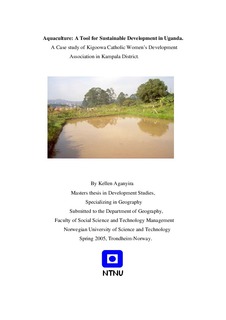| dc.contributor.advisor | Lein, Haakon | nb_NO |
| dc.contributor.author | Aganyira, Kellen | nb_NO |
| dc.date.accessioned | 2014-12-19T14:24:49Z | |
| dc.date.available | 2014-12-19T14:24:49Z | |
| dc.date.created | 2005-06-24 | nb_NO |
| dc.date.issued | 2005 | nb_NO |
| dc.identifier | 125644 | nb_NO |
| dc.identifier.uri | http://hdl.handle.net/11250/264995 | |
| dc.description.abstract | Abstract
Global aquaculture production has grown rapidly and is now among the fastest growing food production sectors in many countries.Introduced over the past 50 years or so,aquaculture in Africa has gone through different levels of growth. The desirability of aquaculture has been due to unreliable and unsustainable use of natural waters for capture fisheries. Due to the country’s concern, the government of Uganda has promoted aquaculture before for nutritional values. However, current policy initiatives that call for collective actions are geared towards commercial aquaculture development.
This work focuses on several aspects of aquaculture development in Uganda viz; past,present and future, potential, reared fish species, benefits, constraints and these are reflected in the policy and institutional arrangements with in the sector. This work has been undertaken with the aim of providing in detail the possible ways and means for sustainable utilization of aquaculture outcomes. Emphasis has been on how members of Kigoowa Catholic Women’s Development Association (KCWDA) have been empowered through group formation and aquaculture activities.
This work also analyses the dynamic gender relations that exist in resource ownership, access and use in Uganda and the implications thereof to aquaculture growth and expansion. Included are the possible options vulnerable people especially women undertake to sustain their livelihoods and those of their families and the community as a whole.
The information in this work is discussed in line with the Sustainable Livelihoods Framework. It therefore aims at providing an additional reference text on the subject and in the context of aquaculture. Details about certain concepts, policies and principles, nature of the sector and supportive literature on various issues are discussed. | nb_NO |
| dc.language | eng | nb_NO |
| dc.publisher | Norges teknisk-naturvitenskapelige universitet, Fakultet for samfunnsvitenskap og teknologiledelse | nb_NO |
| dc.subject | Geography | en_GB |
| dc.subject | NATURAL SCIENCES: Earth sciences: Other earth sciences | en_GB |
| dc.subject | bio-/geovetenskap | en_GB |
| dc.title | Aquaculture: A Tool for Sustainable Development in Uganda.: A Case Study of Kigoowa Catholic Women’s Association in Kampala District. | nb_NO |
| dc.type | Master thesis | nb_NO |
| dc.contributor.department | Norges teknisk-naturvitenskapelige universitet, Fakultet for samfunnsvitenskap og teknologiledelse | nb_NO |
